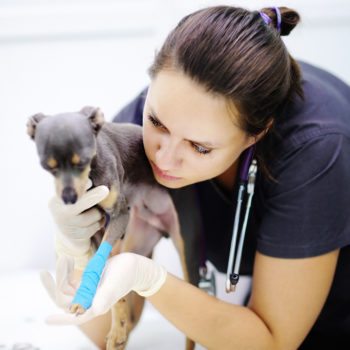Why We Love It
-
$76,230Potential Avg. Salary
-
3.6%Job Growth Rate
-
Growing DemandJob Outlook
-
Dependable Daily WorkloadCareer Attribute
A virologist is a scientist that specializes in the study and research or viral diseases. The also study the growth and development of the viruses and how they affect and impact individuals, animals and plants.
Recommended Schools
What is a Virologist?
The following responsibilities are common for Virologists:
- Prepares, conducts and oversees the study of microorganisms
- Supervises a team of scientists and researchers in laboratory settings
- Trains the research team on proper equipment uses and safety procedures
- Writes technical papers and reports and presents findings to colleagues, administrators and health agencies
- Diagnoses viral diseases and recommends their medical opinion for a treatment plan
A Day In The Life
A virologist studies viruses that affect humans, animals, plants and entire communities in various different environments. Virologists typically split their work between research and teaching.
Some researchers may work in clinical research in the healthcare field to work with patients afflicted with viruses. They work with a wide range of issues like viral pathology, viral oncology, virotherapy, viral replication and emerging viruses.
Typical Work Schedule
This is a full-time, 40 hour work week position. The majority of their time is spent in laboratories, research offices, hospitals and medical facilities.
Projected Job Growth
With the rise of the World’s population, there is also an unfortunate that there is also a rise of infectious viruses. There will be a large demand for those interested in helping treat these viruses in communities.
Typical Employers
These researchers typically work for colleges and universities, government agencies, healthcare organizations like hospitals or clinics and also pharmaceutical companies.
Recommended Schools
How To Become a Virologist
To become a Virologist requires a PhD. Because virology requires a strong science background an undergraduate degree in biology, chemistry or a related science major is required. Coursework should include organic and inorganic chemistry, biology, cell biology, biochemistry, microbiology, physics, mathematics and social sciences. Those that graduate with their Bachelor’s of Science degrees can obtain a position in a laboratory as a technician to gain the requires lab experience necessary to progress in this career.
After gaining this required laboratory experience, they can then apply to graduate school to obtain a Master of Science degree. An individual with a Master of Science degree can then advance to supervisor or manager roles or teaching assistant opportunities.
For those pursuing a doctorate, they will go into programs for immunology, virology, biology, bacteria structure, genetics and cancer biology. Lab work and dissertations will also be required during this time of study. It is also necessary for students to take the qualifying exams required and completing residencies. A PhD is required to teach at a university or college and run research institutes.
Virologist Salary Data
We’ve provided you the following to learn more about this career. The salary and growth data on this page comes from recently published Bureau of Labor Statistics data while the recommendations and editorial content are based on our research.
National Anual Salary
Low Range
$48,980Average
$76,230High Range
$125,200National Hourly Wage
Low Range
$24/hrAverage
$37/hrHigh Range
$60/hrHow do Virologist salaries stack up to other jobs across the country? Based on the latest jobs data nationwide, Virologist's can make an average annual salary of $76,230, or $37 per hour. On the lower end, they can make $48,980 or $24 per hour, perhaps when just starting out or based on the state you live in.
Salary Rankings And Facts
#162 Nationally for All Careers
Above Average Salary Nationally
Programs and Degrees
Here are the most common degrees for becoming a Virologist. a is usually recommended and specifically a degree or coursework that prepares you for the particular field, see below.
Highest Education Among Virologists
- 19.6% Doctorate
- 32% Masters
- 43.8% Bachelors
- 2.2% Associates
- 2.1% College
- 0.2% High School
- 0.1% Less than High School
Job Growth Projections and Forecast
2014 Total Jobs
22,4002024 Est. Jobs
23,200Job Growth Rate
3.6%Est. New Jobs
800How does Virologist job growth stack up to other jobs across the country? By 2024, there will be a change of 800 jobs for a total of 23,200 people employed in the career nationwide. This is a 3.6% change in growth over the next ten years, giving the career a growth rate nationwide of Above Average.
Growth Rankings And Facts
#497 Nationally for All Careers
Above Avg. Growth Nationally
What Companies Employ The Most Virologists
| Industry | Current Jobs | New Jobs Needed | % Increase |
|---|---|---|---|
| Research and development in the physical, engineering, and life sciences | 5,400 | 400 | 0% |
| Pharmaceutical and medicine manufacturing | 4,700 | --- | --- |
| Federal government, excluding postal service | 2,600 | -200 | 0% |












